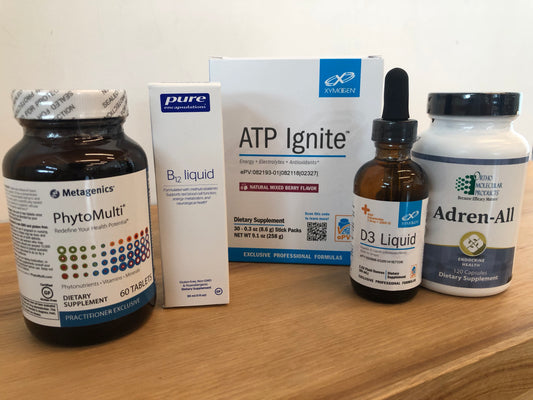Your adrenals have a wide influence over many systems in the body, so the symptoms of adrenal fatigue can mimic other disorders and aren’t easily identifiable. Many people wonder “How do I know if my adrenals need support?“ Some common symptoms include:
- Fatigue not relieved by sleep
- Craving salty foods
- Light headed upon standing
- Fuzzy thoughts or brain fog
- Weight gain
- Insulin resistance
Most people with adrenal fatigue notice that they wake up feeling tired and require significant amounts of caffeine in order to function. They will then notice their energy levels rise and fall dramatically throughout the day. And though they may feel sluggish all day, sleep will likely be difficult and unrestful.
Some common questions we get regarding adrenal fatigue:
“I get light-headed when standing. Is this a sign of adrenal fatigue or is it my blood pressure?”
Low blood pressure and adrenal conditions commonly go hand-in-hand, especially in the later stages of adrenal fatigue. It is important to nourish the adrenals with the nutrients they need, especially the correct amount of minerals.
We recommend incorporating foods rich in the following nutrients:
- Magnesium - dark leafy greens, nuts and seeds, beans/lentils.
- Vitamin B6 - tuna, turkey, and sunflower seeds
- Vitamin B5 - oily fish, eggs, and lean pork
- Vitamin C - kiwi, orange, and yellow bell peppers
Supplements you might consider:
- Spectra-min
- Rehydration
- Adaptopath
“I sleep hard but when I still wake feeling tired. Could this be an adrenal problem?”
You might think you are getting quality sleep, but the stress you’re under during the day could be causing a cortisol drop while you sleep. This all plays a part in the bigger picture of adrenal fatigue. We can’t expect our body to be stressed all day and then get restful sleep and wake up with energy. If you struggle to get quality sleep, it may be beneficial to test your cortisol levels to determine how your adrenals are affecting the problem.
Supplements to consider for sleep and cortisol issues:
- Cortisol Manager
- Calm CP
“My body feels tired, but I have trouble relaxing and winding down.”
It is important that anyone with adrenal fatigue that feels “wired and tired” to get on a regimented sleep schedule. You’ll want to avoid engaging in the “second wind” you might get that occurs after 10:00 pm. Riding that second wind and staying up will further exhaust your adrenals. The golden hours to sleep in the morning are typically from 7-9 am. Most typically feel relief if they can sleep in during those times allowing your cortisol levels to rise. It might also be useful to incorporate relaxation techniques before bed such as a quiet meditation.
Supplements to consider that will help you relax and keep you calm:
- Alpha Gaba PM by Neuroscience
- Ashwagandha
- Magnesium Glycinate
“My fatigue is worse if I skip a meal. I require coffee and carbohydrates to boost my energy throughout the day.”
It is critical to get on a regular eating schedule and not eat according to your energy slumps throughout the day. Your adrenals will eventually adjust and you won’t feel the dramatic swings in energy. To best support your adrenals, eat within an hour of waking, and then eat every 2-3 hours. Make sure you’re avoiding starchy carbohydrates by themselves and choose a balanced ratio of protein, fats, and carbohydrates. Avoid hydrogenated and partially hydrogenated oils and don’t skip meals!
Lifestyle techniques are critical for ultimate recovery from adrenal imbalance. Relaxation or meditation, regulation of sleep cycle, and appropriate exercise (not too little or too much) combined with correct eating habits are the backbone to get you back on track.
Supporting your adrenals with food and supplements starts with the basics of magnesium, B vitamins and Vitamin C. Secondary approaches may include herbals such as ashwagandha, rhodiola, or licorice root. In some cases, glandular support is necessary as well.
Contact our wellness team for information regarding lab tests that can determine cortisol levels, adrenal profile, and hormone imbalance.



